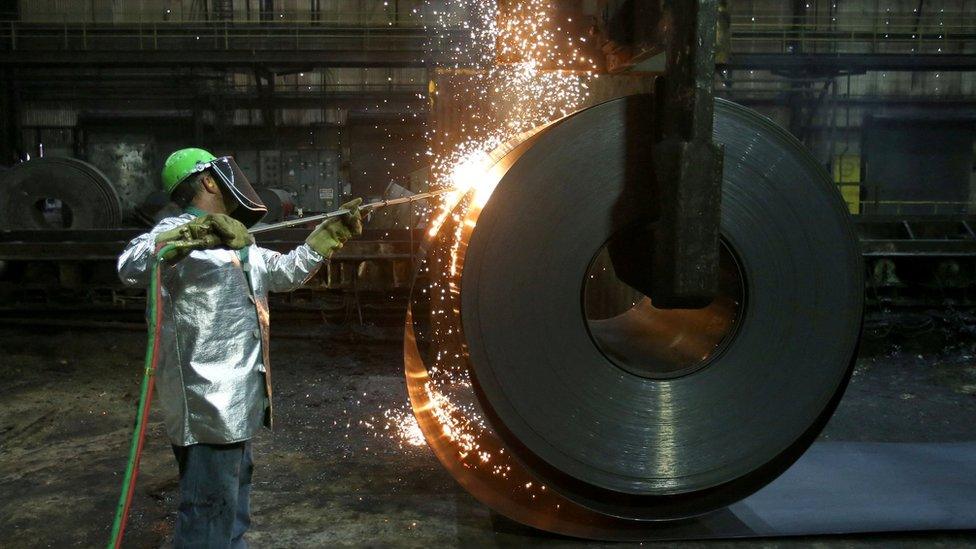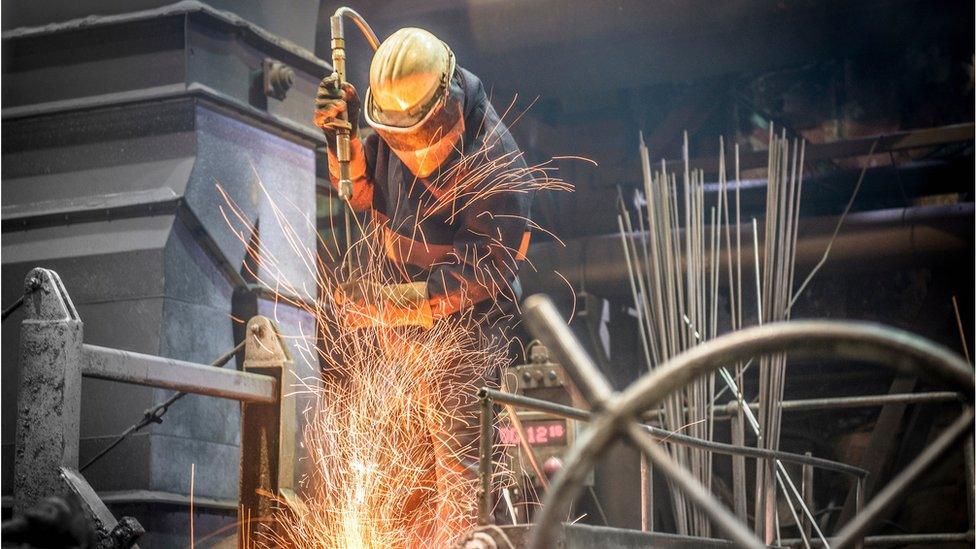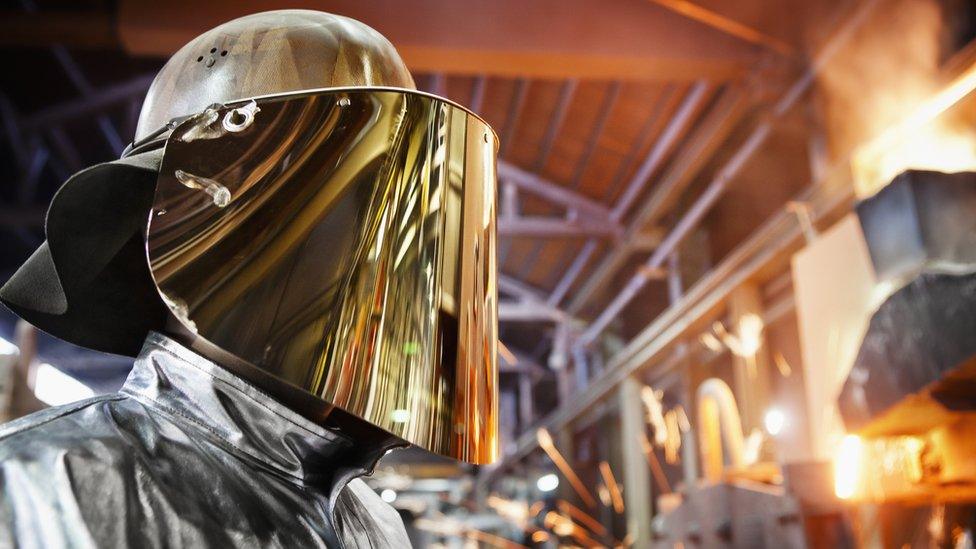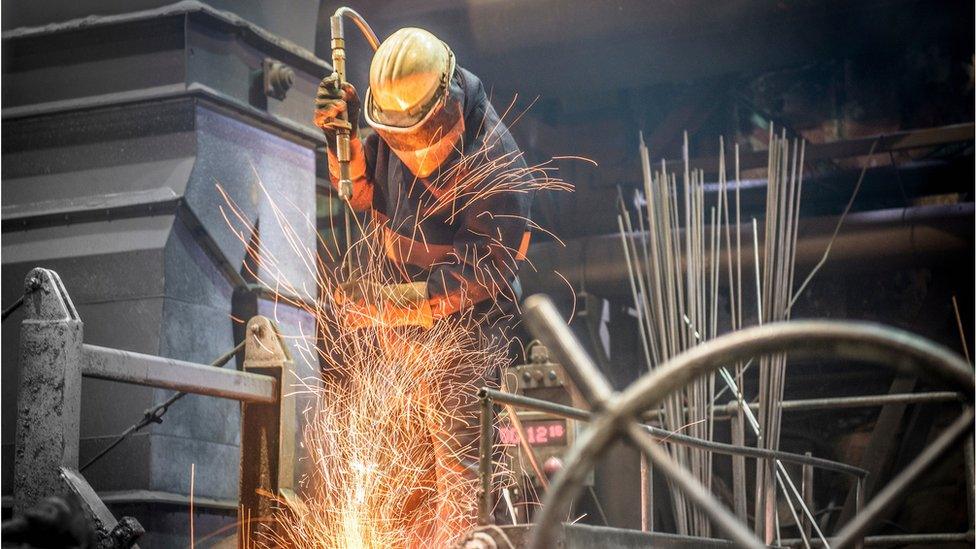US and UK finally sit down on steel tariffs
- Published
- comments

The US and UK have begun formal negotiations over Trump-era tariffs on UK steel and aluminium exports.
Trade officials in both countries said they were committed to an "expeditious outcome" that would help preserve metals manufacturers in both markets.
The trade dispute has been a longstanding thorn in relations between the two allies.
The US reached a deal to remove border taxes on European metals shipments last year.
Under the Trump administration, the US imposed a 25% duty on foreign steel and 15% tax on foreign aluminium, setting off a firestorm of criticism - especially from allies, including the UK, who imposed tariffs on some US goods, such as whiskey, in retaliation.
The US has since lifted some of the measures, which were supported by many steel-makers in the US.
Under President Joe Biden, it has reached a deal with Europe and has started negotiations on the issue with Japan.
But British exporters continue to face the border taxes.
One UK steel exporter has already said it is shifting production to Spain as a result. United Cast Bar Limited told the BBC it was unlikely to move production back to the UK once it had been moved, unless an agreement was reached with the US very quickly.
In a statement announcing the start of talks, UK and US trade officials said: "Both parties are committed to working towards an expeditious outcome that ensures the viability of steel and aluminium industries in both markets against the continuing shared challenge of global excess capacity and strengthens their democratic alliance."
The statement followed a virtual meeting between UK Secretary of State for International Trade Anne-Marie Trevelyan and United States Secretary of Commerce Gina Raimondo. United States Trade Representative Katherine Tai also signed onto the statement.
Ms Trevelyan called Wednesday's meeting "productive", and said "we want a resolution as soon as possible which supports UK businesses and further strengthens our trading relationship".
The UK steel lobby welcomed the news. It said the existing tariffs had reduced UK exports by nearly 50%.

"That a few weeks into 2022 a resolution appears to be in sight is hugely welcome news to the steel sector and steelworkers across the UK," UK Steel said.
"Given the competitive disadvantage created by the EU deal, it is vital that these talks are concluded swiftly to limit any additional damage to UK producers."
The industry body added that it hoped the UK would be able to get an even better deal with the US than the European Union as it "put its new independent trade powers to full use".
American whiskey-makers, whose exports to the UK have dropped by more than half since UK retaliatory tariffs came into effect in 2018, also said they hoped a deal would come soon.
"Securing the immediate removal of the UK's 25% tariff on American whiskeys helps support U.S. jobs as the economy seeks to recover from the harsh economic impacts and significant supply chain disruptions caused by the COVID-19 pandemic," said Rob Maron of the Distilled Spirits Council of the United States.
The statement from the US and UK said joint measures to address over-production in China would be a focus of future discussions. They blamed the country for creating "excess capacity", which they said had created "distortions that...pose a serious threat to market-oriented steel and aluminium industries in the United Kingdom and the United States, and to the workers in those industries".
They said the talks were focused on finding a way to partner "to promote high standards, address shared concerns and hold countries that practise harmful market-distorting policies to account".


After this ministerial meeting, talks between UK and US officials begin on Thursday and the UK side is keen for them to progress at pace and be wrapped up in weeks, not months.
The joint statement gives them something to work on. It puts the blame for global excess capacity in the steel and aluminium industries "largely" on China, and says the distortion that causes poses a problem for companies and workers in both the UK and the US.
Neither side wants their trade dispute to worsen, so pointing a finger at a rival third party is one way out.
UK steel companies are also desperately keen to get the 25% tariffs on their exports removed as soon as possible - it puts them at a significant competitive disadvantage compared to their EU counterparts.
But there are other political considerations. There is still concern in Washington about the entirely separate negotiations on Northern Ireland between the UK and the EU, and British threats to suspend parts of the Northern Ireland Protocol.
Put it this way: if the talks on Northern Ireland take a negative turn, that will certainly not make a resolution of the steel dispute any easier.
So, it will be interesting to see whether the Americans share the British desire to get this sorted within weeks. If they do, that will be welcome news in London. If they don't, pressure on the UK government to step up its retaliatory measures will intensify.

Related topics
- Published4 January 2022

- Published12 January 2022
